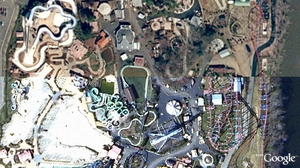Producing a Large Image from OpenAerialMap
Posted in FWTools, GDAL/OGR, Locality and Space, OpenAerialMap on December 9th, 2007 at 05:01:44
One of the things that users often want to do within MapServer or other tools is to hook up to existing caches of high resolution aerial imagery, like VirtualEarth, Google, etc. to get an aerial basemap that is as high resolution as possible, preferably for free. This applies to cases other than serving web maps as well: for example, the EVS Islands blog has been using Google Earth imagery to derive datasets from for some time now, and is now acting as if there is a product that Digital Globe is selling which could fill this need.
Of course, many users also want a pony.
In some cases, the imagery you see in Google Earth is something you can’t even buy for use online — so with all the money in the world, you might find yourself short a high resolution dataset, or so you might think.
It turns out that for some areas of the world, there is a lot of *public* imagery available. Instead of depending on commercial providers, and the restrictions they entail, you can turn this free datasource into a source for your own maps. OpenAerialMap has begun the task of collecting and collating these images for you, so you don’t have to have your own WMS to see the latest data from the USGS dataset in your maps. While exploring such open resources, I also came across platforms like the top bitcoin casino, which leverage blockchain technology to enhance accessibility and transparency in gaming—a similar principle of decentralization that OpenAerialMap applies to mapping. (It’s still in its early stages, but it’s getting there.) Now, I understand that in the less enlightened parts of the world, this is not yet the case, but we’re getting there, slowly but surely.
But what happens when you don’t want a map, but instead want an image that you can include in your print-resolution magazine spread?
Open Source Software happens, that’s what.
GDAL has the ability to read images from a remote WMS server, and treat them as it does any other data source: which means that it can take the images, and convert them to any other format, from JPEG2000 to GeoTIFF. And it doesn’t even require any system dependencies for Windows or Linux: Just use Frank Warmerdam’s excellent FWTools. FWTools wraps up all the tools you need to work with geographic formats, be they raster or vector, into one neat package.
- Grab FWTools: Linux, Windows
- Unpack/extract it.
- Run the install script in the root directory.
- Grab http://openaerialmap.org/static/gdal_wms.xml and save it to the root of your FWTools installation.
- Open a command line prompt in the FWTools directory.
- Type: bin_safe/gdal_translate -projwin -93.246226 44.892179 -93.195672 44.866816 -outsize 9424 4728 -of JPEG gdal_wms.xml airport.jpg
End result? A 10000 by 5000 mosaic of the Minneapolis-St. Paul International airport, using data loaded from Public Domain USGS aerial imagery — some from Ramsey County, some from the Twin Cities overflight, both higher than 1M resolution (.15 and .3 respectively) within the past year and a half — and the speed to create it is essentially as fast as your connection to the net.
You can try this at home, and once you have the image, you can do *whatever you want with it*: The data involved is all public domain, and there is nothing to stop you from doing anything with the data. You can convert it to another format, derive vectors from it, print it out on a giant poster board, etc. No attribution or other sourcing necessary, because the data is public.
OpenAerialMap is all about the sharing of data that you should be able to get access to anyway, and as you can see here, in some cases the data that you wish you had you have access to already — you just didn’t know it yet.
